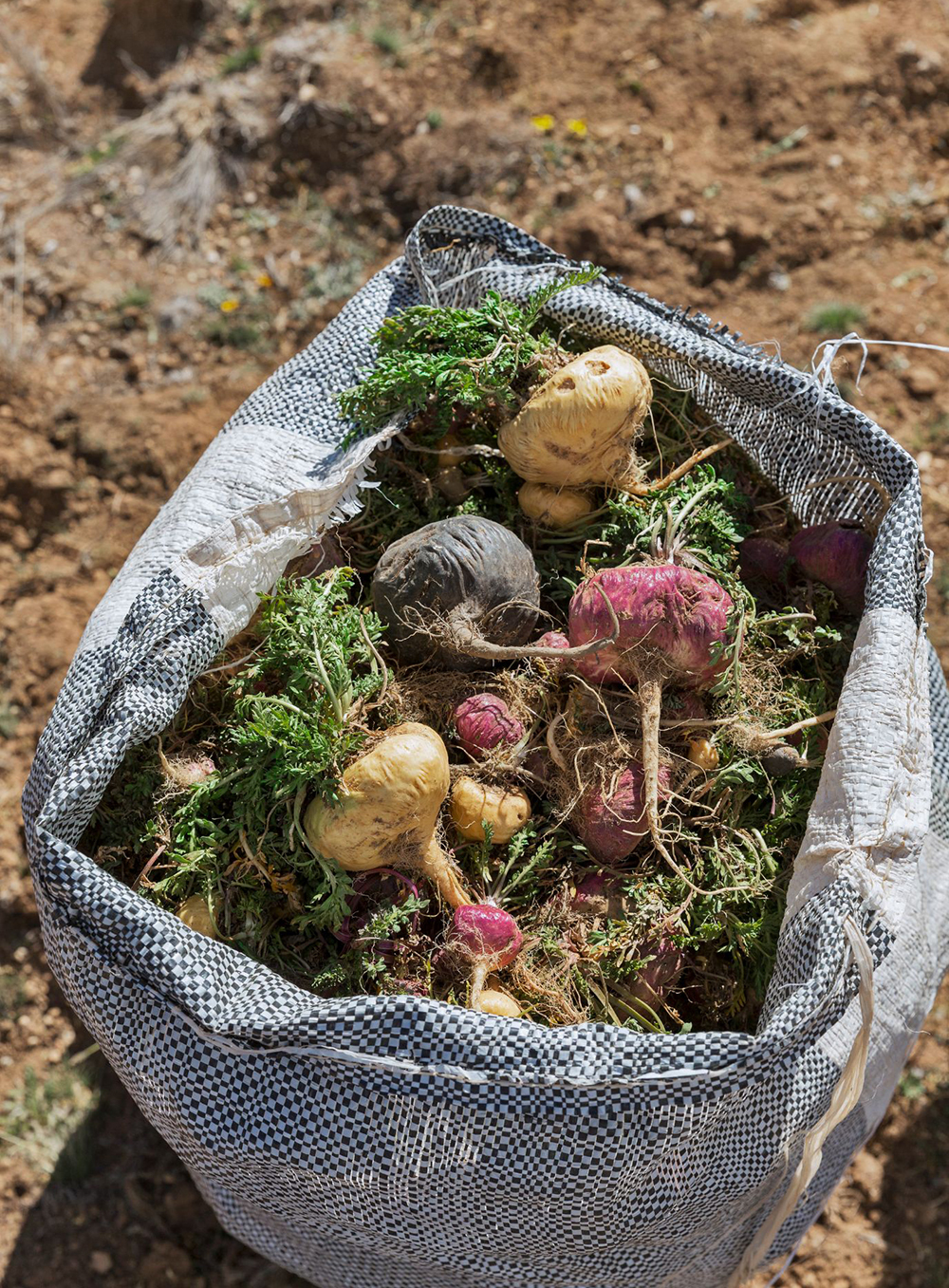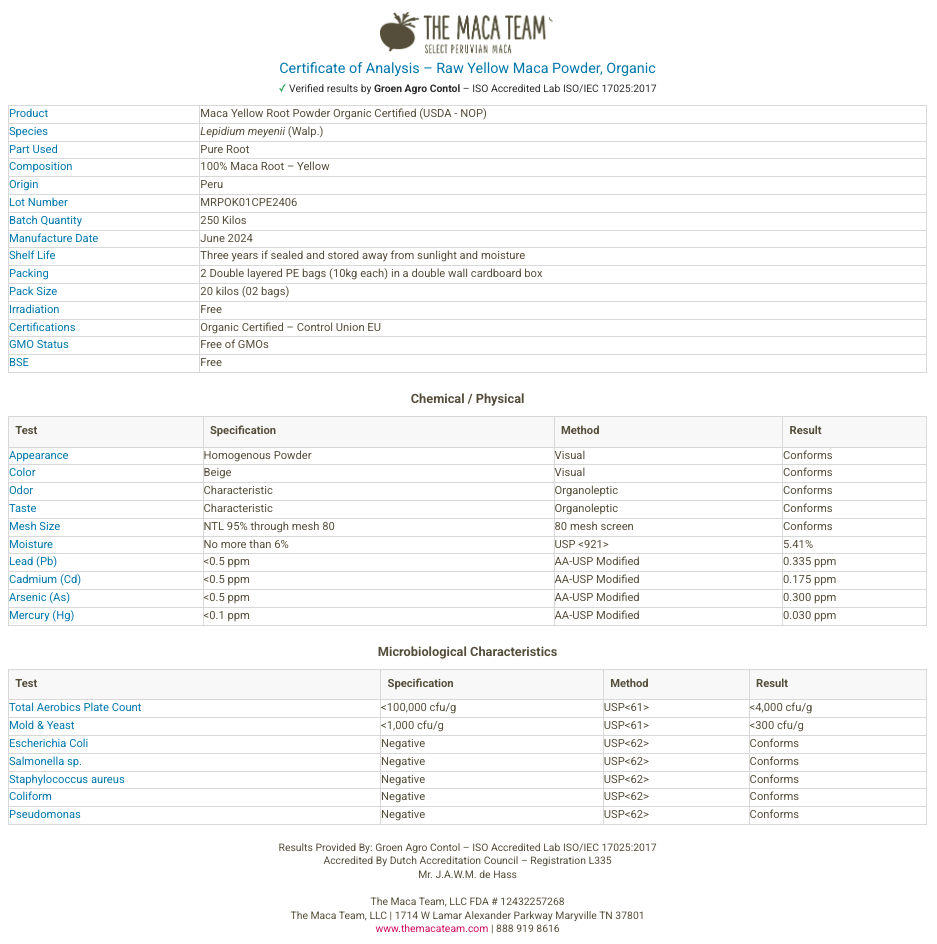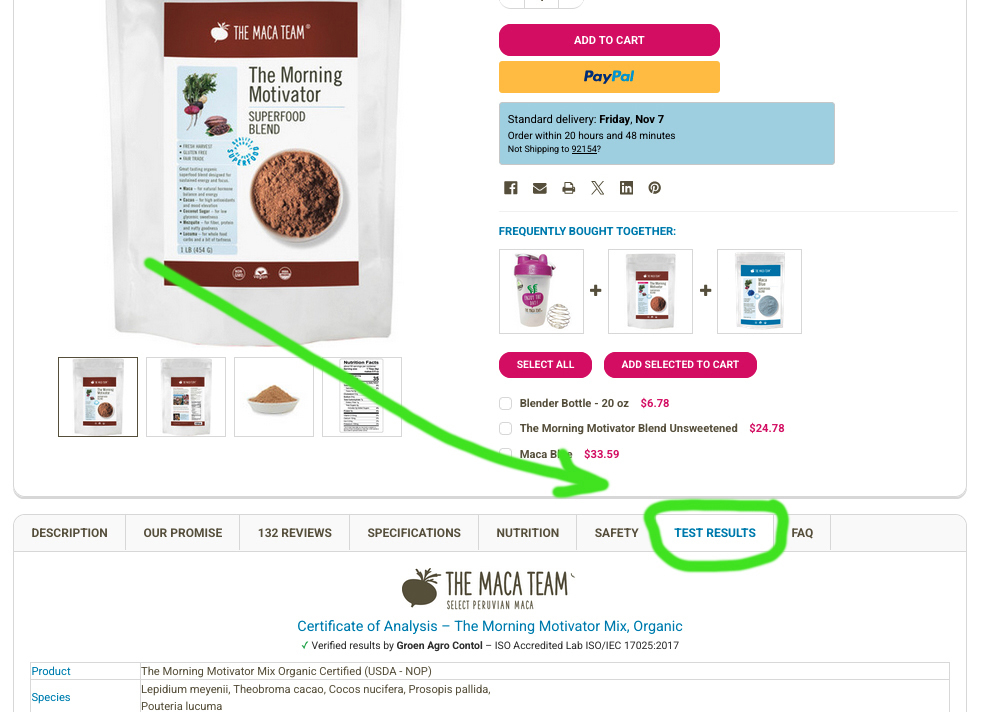Maca Safety Testing & Certificates of Analysis (COA)
What Is A COA?
Certificate of Analysis (COA) defined: A lab-verified document that confirms identity, purity, safety, potency, and compliance for a specific batch of maca.
Independent laboratory testing is carried out on every batch of maca we sell. This helps us ensure purity, potency, safety, and authentic Peruvian maca with every order.
Note: The results of these tests are available in real time on each product page — to view them, simply go to any product and click on the tab that says “Test Results.”
Why COAs Matter
COAs protect customers by verifying authenticity, purity, and safety with real laboratory data — not marketing claims. They ensure the maca you receive is truly Peruvian, clean, nutrient-rich, and safe for daily use.
Learn more about maca’s benefits and safety: Maca Benefits · Maca Safety · Our Story
We Only Receive A+ Maca Products That Have Passed All Testing

Maca is a powerful root food with a long history of traditional use in the Peruvian Andes. We honor that heritage and modernize it by making sure that all the products we offer are as healthy and effective as possible.
We test every batch to ensure it is:
- Free from harmful contaminants
- Verified as real maca root from Peru
- Clean, pure, and fresh
- Safe for daily use
- Nutritionally intact and potent
How We Verify Every Batch
High-altitude family co-ops
Sun-dried or low-heat dehydrated
Raw • Gelatinized • Liquid
ISO/IEC 17025:2017 accredited
Heavy metals • Microbes • Pesticides • Identity
Fail = rejected, not shipped
Fresh, verified, fully traceable
We only sell maca that passes every test without exception
What Our Maca Is Tested For
Each batch is verified by independent third-party labs for:
Identity & Potency
- Maca species verification
- Nutrient profile & natural compounds
Microbial Safety
- Zero tolerance: Salmonella, E. coli
- Yeast & mold
- Aerobic plate counts
Heavy Metals (Food-Safety Standards)
- Lead
- Arsenic
- Cadmium
- Mercury
All results must fall well below strict international safety guidelines.
Pesticides & Residue Screening
- Wide-spectrum organic pesticide screen
- Complies with organic standards
Additional Quality Measures
- Moisture content
- Foreign material screening
- Sensory evaluation (aroma, texture, color)
If a batch does not pass, it is rejected at the processing plant and destroyed.
Our Maca Root Processing and Testing Process: Step-By-Step
- Maca harvested by our partner farmers in Junín & Pasco, Peru
- Roots are separated by color and graded
- Roots are then dried either in the sun or in large dehydrators (for premium products)
- Roots are then processed into a powder (raw or gelatinized) or made into a liquid extract
- Samples sealed and sent to ISO/IEC 17025:2017 accredited labs
- Full safety & purity panel completed
- COA issued
- Results reviewed by our processors
- Only approved lots are packaged and shipped
Sample Certificate of Analysis
Below is a sample COA to help you understand the format and data included.
The top section includes important product information such as batch number, manufacture date, and origin.
The testing sections show four columns as follows:
- Test — what is being evaluated
- Specification — the expected value or acceptable range
- Method — how the test is run
- Result — the outcome (numerical or verbal)

Where to Find the COA for Your Product
Each product we send out has a batch number and a “best by” date — you’ll see those on the label or jar.
You’ll find the current COA directly on the product page for the item you purchased. Look for the tab called “Test Results.” Here’s what that looks like:

We keep COAs up to date on product pages, but on occasion there may be overlap with any given product. If you open a product months after ordering and our site shows a newer batch, contact us and we’ll email you the COA for your exact batch.
This ensures you always see test results for the current or exact batch — never a generic reference.
Note that the COA data comes to us in bulk format from our processor. We then upload that data into the product tabs you see on our site in order to make it easier to read.
Who Performs Our Testing
Our processors work exclusively with independent, accredited laboratories that meet international testing standards, specifically ISO/IEC 17025:2017.
Each COA specifies the name of the lab that performed the analysis. These labs are certified, accredited, and highly specialized in botanical and food-safety analysis.
Our Promise
- Ethical sourcing from traditional Peruvian farmers
- Certified organic agricultural practices
- Full batch traceability
- Third-party testing
- COAs for every batch
We use these products ourselves. We give them to our families. You deserve the same confidence and peace of mind.
Frequently Asked Questions
Do you test every batch of maca?
Yes — every batch is tested immediately after processing by independent accredited labs. Only batches that pass every marker are prepared for shipping to us.
Where are the COAs located?
On each product page under the “Test Results” tab, so you always see results for the current batch.
Do you test for heavy metals?
Yes — all maca must fall well below strict global safety limits for lead, arsenic, cadmium, and mercury.
Do you test for pesticides?
Yes — we screen for a wide panel of agricultural chemicals. Our traditional farmer co-ops grow maca without synthetic pesticides, honoring the way maca has been farmed for generations.
What happens if a batch fails?
The entire batch is rejected and destroyed. It is never shipped to us or made available to customers. We only receive and sell maca that has passed 100% of testing requirements.
Are your tests third-party verified?
Yes — all tests are performed by independent accredited laboratories. The lab name and accreditation appear on every COA.
What if the COA on the website doesn’t match my batch?
If you ordered previously and we have since moved to a new lot, simply contact us and we will email you the COA for your specific batch. We keep all COAs on file for full traceability.
Do you test raw, gelatinized, and extract products the same way?
Yes — all maca products we offer undergo rigorous independent testing, regardless of format or processing type.
Final Thoughts
At The Maca Team, we believe you deserve to know exactly what’s in the products you enjoy every day. That’s why every batch of our maca is independently tested and verified for purity, safety, and authenticity. Our Certificates of Analysis (COAs) are part of our ongoing promise to keep things honest, transparent, and rooted in integrity — so you can feel great about what you’re putting in your body and where it comes from.
If you have questions about maca quality and testing...
Just reach out — we’re happy to walk you through anything.
![]()

Mark Ament holds dual Master’s degrees in Latin American Studies and American Indigenous Culture and Religions. A long-time advocate for whole-food nutrition, he discovered maca in the early 2000s and founded The Maca Team in 2009. Mark works directly with traditional maca farming co-ops in Peru and is dedicated to transparent, research-based information and the highest quality sourcing.
Last updated: November 2025
